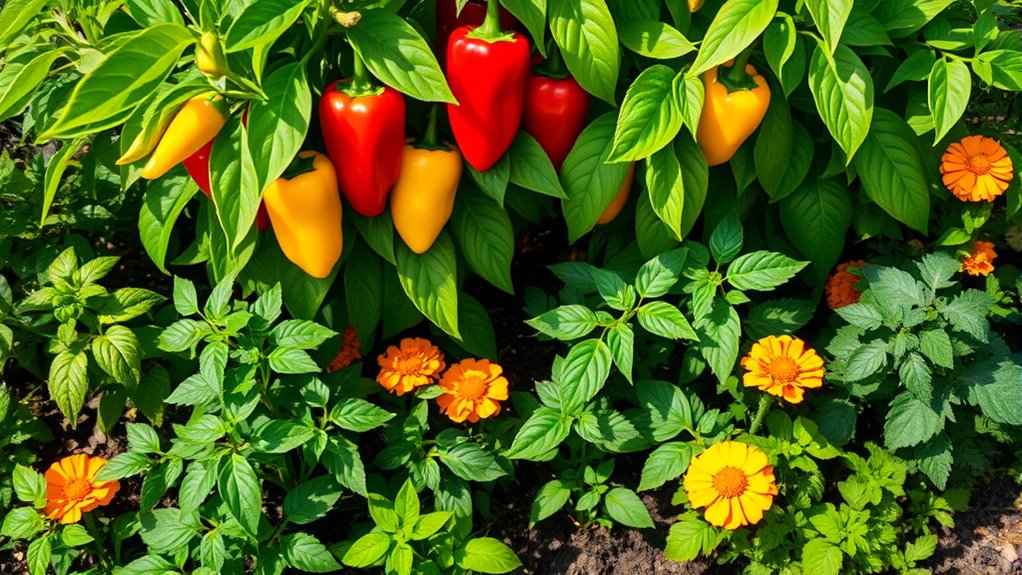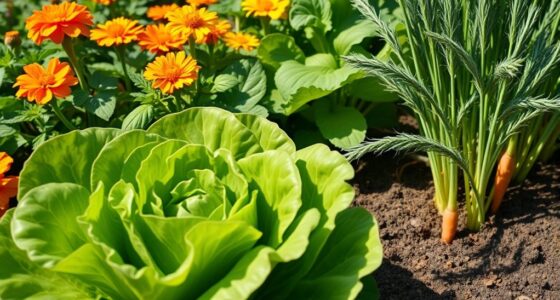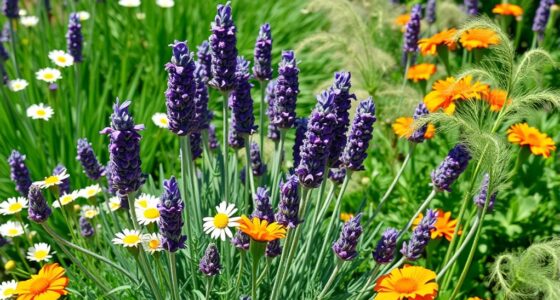Planting basil, marigolds, carrots, onions, chives, nasturtiums, spinach, lettuce, celery, and eggplant alongside your peppers can boost growth, control pests, and improve soil health naturally. Herbs like basil and chives repel pests, while marigolds and nasturtiums attract beneficial insects and act as trap crops. Crops like carrots and greens enhance soil and reduce weeds. Want to learn how to make your garden thrive? Keep exploring ways to optimize your pepper companion planting!
Key Takeaways
- Basil, marigolds, and nasturtiums improve pepper growth while repelling pests and attracting beneficial insects.
- Carrots and onions/chives help with soil aeration and pest control around pepper plants.
- Companion herbs like garlic and chives deter specific pests such as beetles and aphids.
- Dense greens like spinach and lettuce suppress weeds and enhance soil fertility for peppers.
- Using trap crops and natural pest repellents creates a balanced, pest-resistant garden ecosystem.
Basil
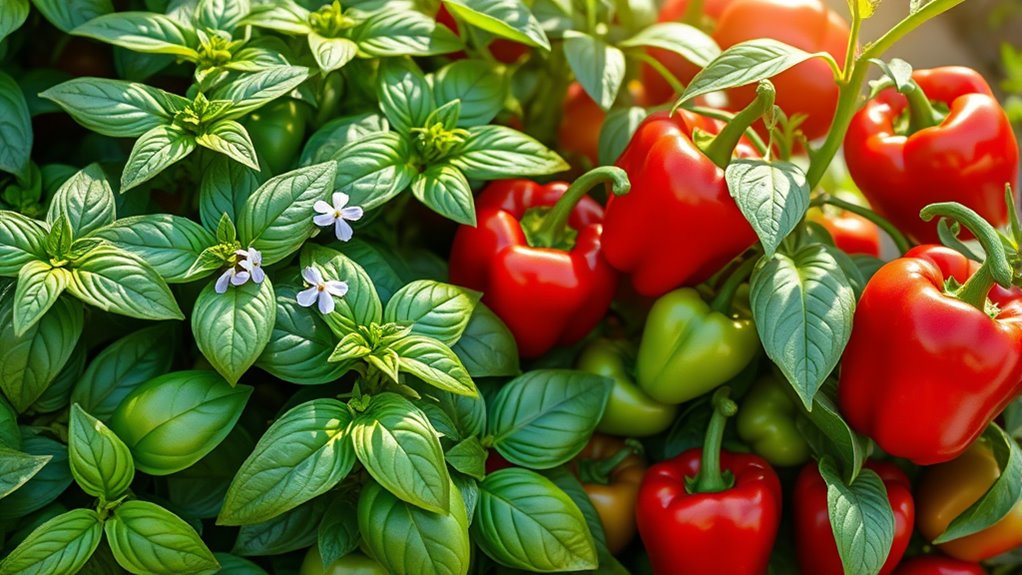
Have you considered how basil can benefit your pepper plants? Planting basil nearby can improve their flavor and boost growth. Basil helps repel pests like aphids, mosquitoes, and spider mites that often target peppers. Its strong aroma confuses these insects, making it harder for them to find your pepper plants. Additionally, basil attracts beneficial insects such as pollinators and predatory wasps, which help keep pest populations in check. Basil also has a natural antifungal property that can reduce the risk of fungal diseases on your peppers. Plant health benefits can enhance your overall planting strategy by providing better insights into plant health. Furthermore, some studies suggest that companion planting with basil can also contribute to sustainable gardening by reducing the need for chemical pest controls. Plus, basil is easy to grow and adds a fresh, aromatic touch to your garden. By pairing basil with your peppers, you enhance plant health and create a more vibrant, pest-resistant garden environment. Incorporating self watering plant pots can also support consistent watering, ensuring your basil and peppers thrive together.
Marigolds
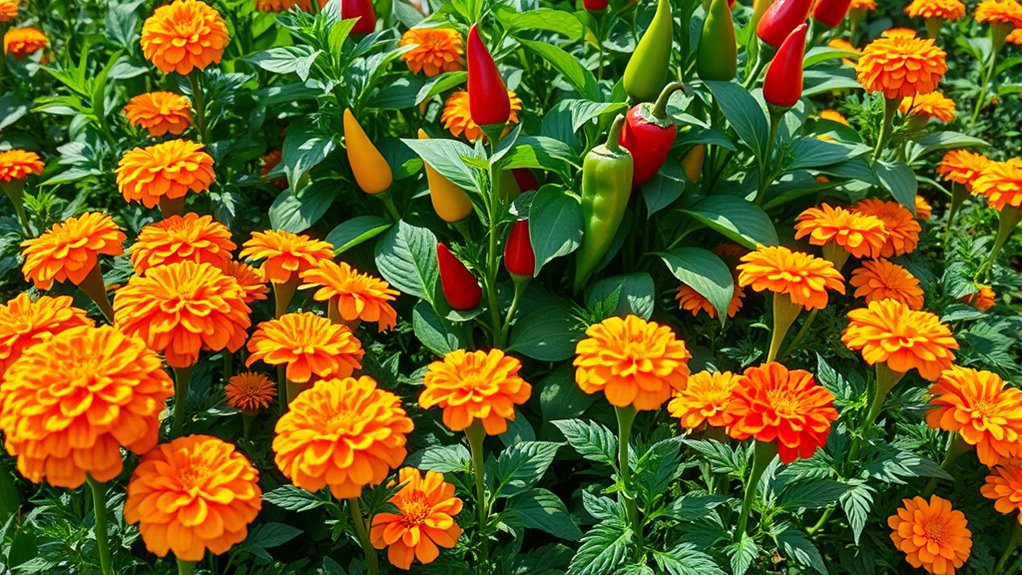
Marigolds are a popular choice for companion planting with peppers because they bring both aesthetic appeal and practical benefits to your garden. Their bright, cheerful blooms add color and charm, making your garden more inviting. Beyond beauty, marigolds act as natural pest repellents; their scent deters harmful insects like nematodes, aphids, and whiteflies that can damage peppers. Planting marigolds near your peppers can reduce the need for chemical pesticides, promoting a healthier garden environment. They also help improve soil health by suppressing certain soil-borne pests. Marigolds are easy to grow and maintain, thriving in full sun and well-drained soil. Incorporating them into your pepper bed creates a vibrant, pest-resistant garden that boosts your overall yield and plant health. Additionally, marigolds can enhance the overall garden ecosystem by attracting beneficial insects that prey on pests.
Carrots
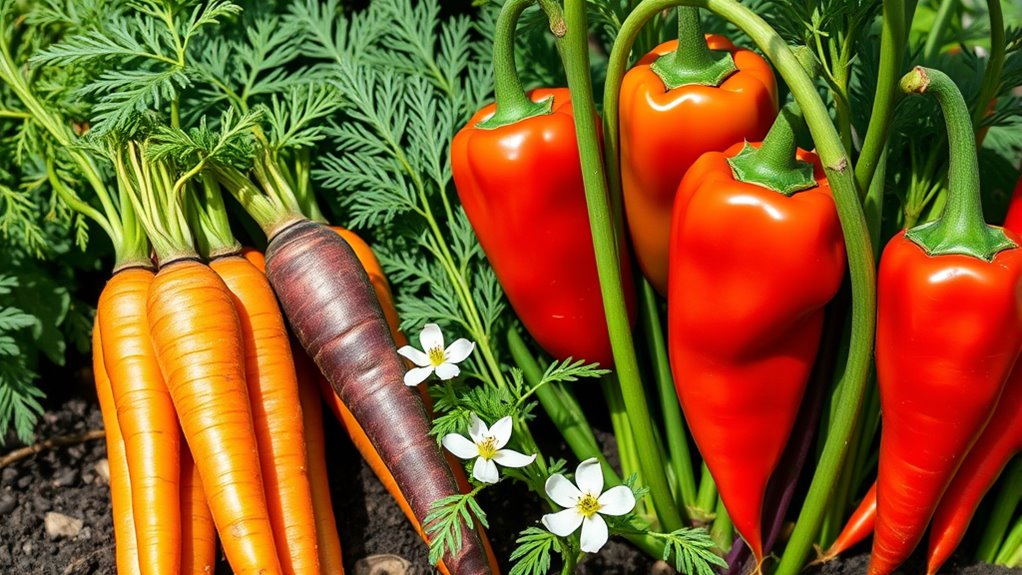
Planting carrots alongside peppers can be highly beneficial because they complement each other in the garden. Carrots grow underground, helping break up soil and improve aeration, which benefits peppers’ roots. Their different growth habits mean they won’t compete for space above ground, making efficient use of your garden bed. Carrots also help attract beneficial insects that can reduce pest problems for peppers. Additionally, carrots don’t attract pests that typically bother peppers, so they’re a low-risk companion. Growing these two together can boost overall yield and health. Just be sure to give carrots enough space to develop properly, and keep the soil loose and well-drained. Regularly monitoring pest management strategies is essential to maintain a healthy garden ecosystem. Incorporating crochet techniques into your garden planning can also help create protective covers or decorative garden accents. Proper soil preparation and plant spacing further enhance their compatibility. Using soil amendments can improve soil fertility and support healthy growth for both crops. It is also beneficial to select disease-resistant varieties to prevent common pepper and carrot illnesses. Overall, carrots make an excellent partner for peppers, fostering a healthy, productive garden ecosystem.
Onions and Chives
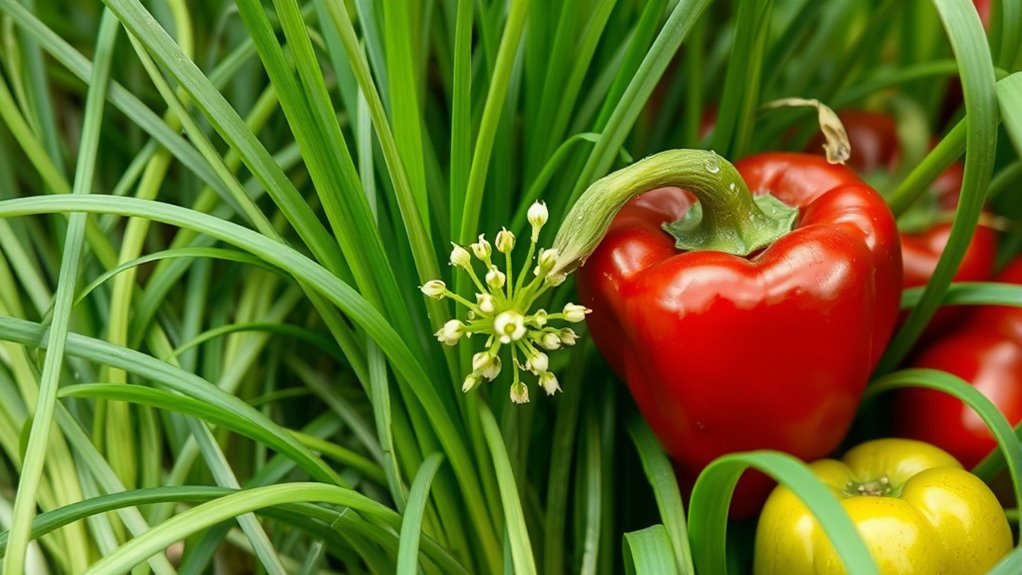
Onions and chives are excellent companions for peppers because their strong scents can help deter pests and enhance overall plant health. Their aroma confuses pests like aphids and spider mites, reducing infestations. Additionally, they can improve soil health by suppressing certain soil-borne diseases. Planting onions and chives near peppers creates a natural pest barrier without chemicals. The vetted product reviews also highlight how companion planting can contribute to a healthier garden ecosystem. Moreover, incorporating beneficial insects attracted by these plants can further protect your peppers from common pests. Understanding pinball machine weight is also important if you plan to set up your garden with heavier planters or structures, ensuring stability and safety. Furthermore, understanding DE – Patchology.ORG can help gardeners find reliable information on innovative gardening products and techniques. Recognizing the soil microbiome can also enhance the effectiveness of companion planting strategies.
Nasturtiums
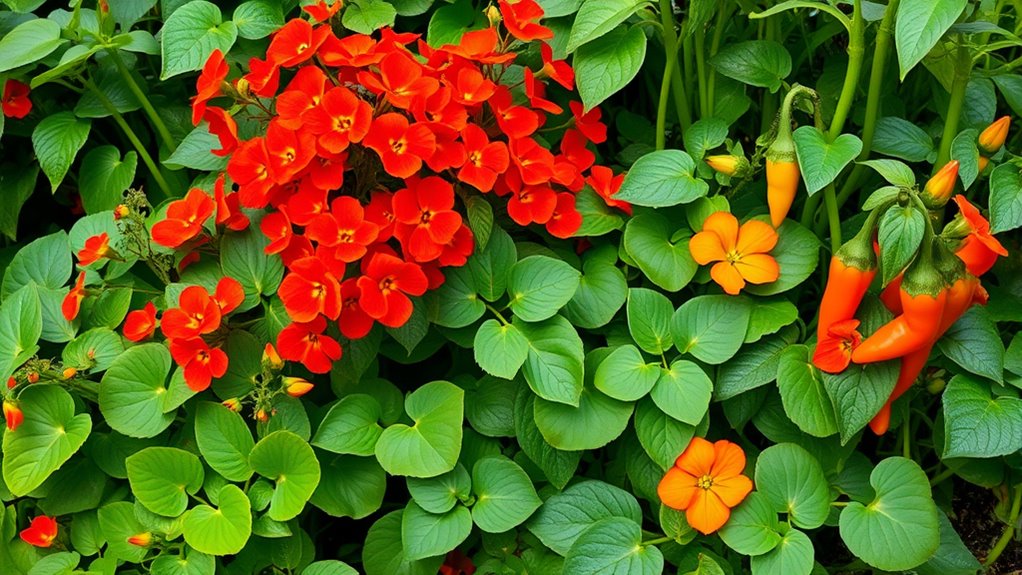
Nasturtiums are a popular companion for peppers because they act as natural pest repellents and attract beneficial insects. When you plant nasturtiums nearby, you’ll notice several benefits:
- They repel aphids, whiteflies, and beetles that often attack peppers.
- Their bright flowers attract pollinators like bees, boosting fruit production.
- Nasturtiums serve as trap crops, drawing pests away from your peppers.
- Their edible leaves and flowers add flavor and color to your garden, making your planting space more vibrant.
- Additionally, they can improve garden biodiversity by encouraging a healthier ecosystem.
- Their ability to attract beneficial insects can also enhance biological control, reducing the need for chemical interventions.
Spinach and Lettuce
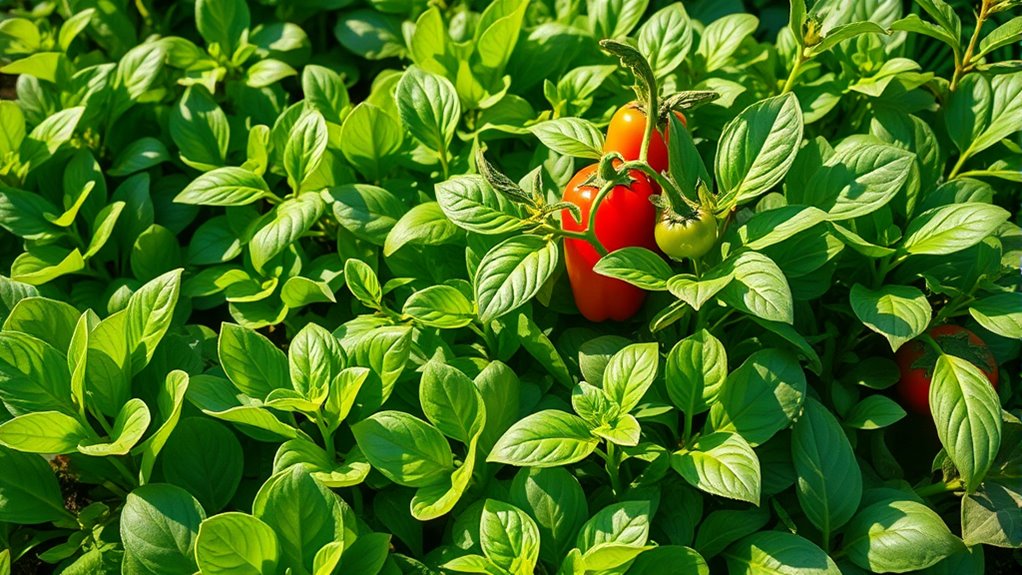
Planting spinach and lettuce near your peppers can boost leaf growth and provide quick ground cover. They naturally suppress weeds, reducing the need for extra maintenance. Plus, their roots help improve soil nutrition, benefiting your entire garden.
Enhances Leaf Growth
When grown alongside peppers, spinach and lettuce can markedly boost leaf growth by improving soil health and providing beneficial shade. Their fast-growing nature helps create a microclimate that reduces heat stress on peppers, promoting lush foliage. Here’s how they support leaf development:
- Nitrogen Fixation: Spinach and lettuce enrich the soil with nutrients, fueling healthy leaf growth. Additionally, their rapid growth rate can help suppress weeds that compete for nutrients, further benefiting pepper plants.
- Shade Provision: Their broad leaves shade the soil and pepper plants, preventing dehydration and heat damage.
- Soil Moisture Retention: Their dense foliage helps retain moisture, ensuring consistent hydration for peppers.
- Soil Aeration: Their roots break up compacted soil, improving oxygen flow to pepper roots, encouraging vigorous leaves. Incorporating diverse plant varieties can also promote soil biodiversity, which benefits overall plant health.
- Aura Balance: Incorporating companion plants like spinach and lettuce can positively influence the emotional and spiritual environment of your garden, fostering a more balanced growth. Including such plants promotes a harmonious ecosystem that supports overall plant health and vitality.
Suppresses Weeds Naturally
Growing spinach and lettuce alongside peppers naturally suppresses weeds by creating a dense ground cover that outcompetes unwanted plants. Their quick growth forms a leafy mat that shades the soil, making it difficult for weeds to establish roots. This dense cover reduces sunlight reaching weed seeds, preventing germination and growth. Additionally, spinach and lettuce absorb nutrients and water efficiently, leaving fewer resources available for weeds. By filling in space between pepper plants, they minimize open areas where weeds could thrive. Regular harvesting also encourages continuous growth, maintaining the dense canopy. Overall, planting spinach and lettuce helps you keep the garden tidy and weed-free without relying on chemicals or mechanical removal. This natural method supports a healthier, more sustainable pepper garden, especially when combined with weed suppression techniques that further reduce unwanted plant growth.
Improves Soil Nutrition
In addition to suppressing weeds, spinach and lettuce can boost your garden’s soil health by enriching its nutrient content. These leafy greens are fast-growing and pull nutrients from the soil, which benefits nearby plants like peppers. Here’s how they help:
- Fix Nitrogen: Spinach and lettuce absorb nitrogen, reducing the need for fertilizers.
- Improve Soil Structure: Their roots loosen compacted soil, enhancing aeration and water absorption.
- Recycle Organic Matter: When they decompose, they add organic material that fuels beneficial microbes.
- Encourage Microbial Activity: Their rapid growth supports healthy soil ecosystems, boosting nutrient availability.
Planting spinach and lettuce as companions creates a cycle where soil health improves, leading to healthier, more productive pepper plants.
Celery
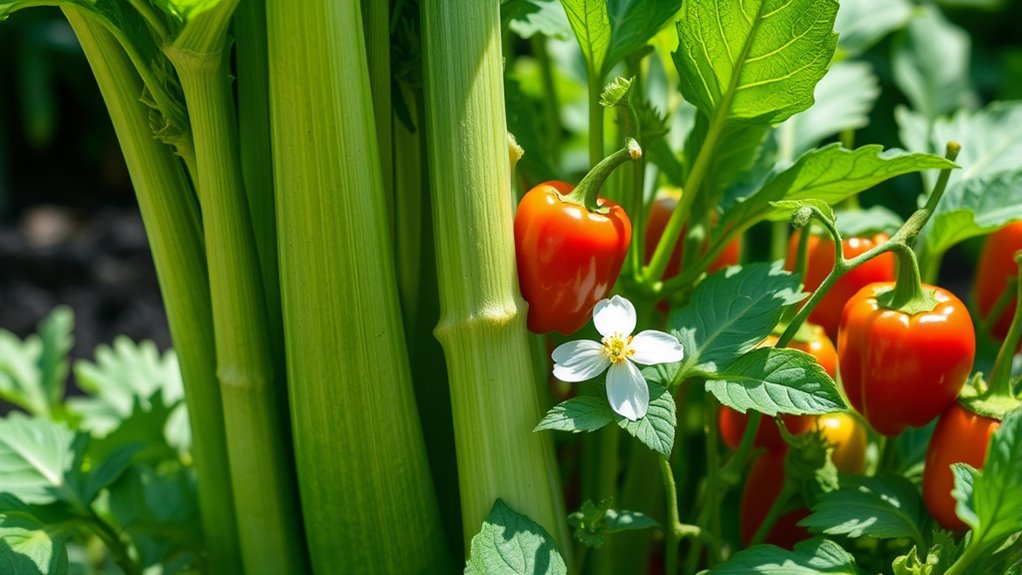
Have you considered planting celery alongside peppers? Celery can be a great companion because it attracts beneficial insects like hoverflies and parasitic wasps that prey on pests threatening your peppers. It also helps improve soil moisture and adds diversity to your garden, reducing the risk of disease spread. Keep in mind that celery needs consistent watering and cool temperatures, so plant it where it gets partial shade if you’re in a hot climate. Its shallow roots won’t compete heavily with peppers for nutrients, making it a practical mix. Additionally, celery’s aromatic leaves can help repel certain pests, providing natural protection for your pepper plants. Moreover, celery’s compact growth habit makes it an ideal companion in small garden spaces, maximizing your planting area. Overall, celery is a versatile companion that promotes a healthier, pest-resistant garden environment.
Eggplant
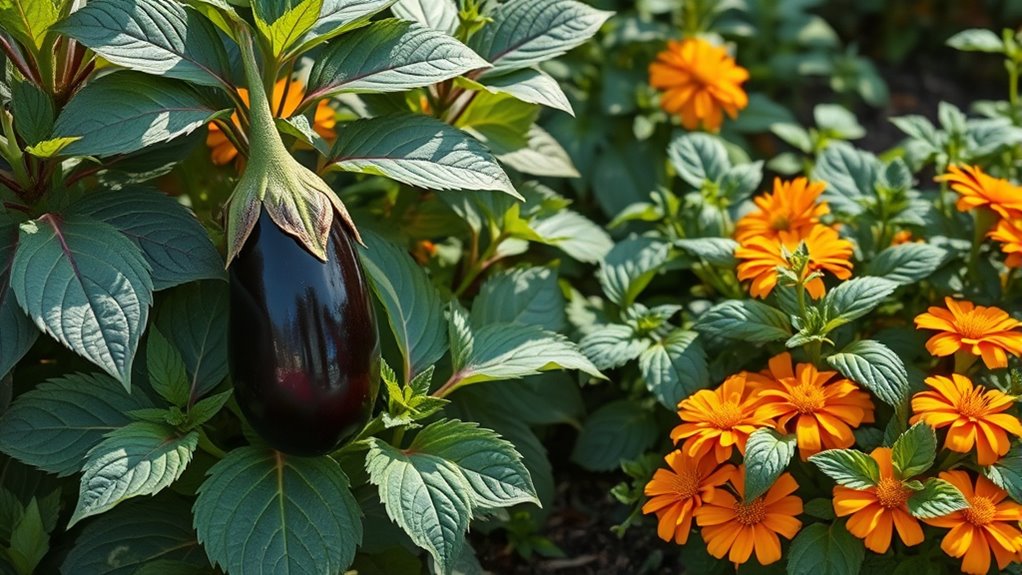
Eggplants can benefit from nearby plants that help repel pests and improve growth. By choosing the right companions, you can reduce the need for chemical controls and promote a healthier garden. Let’s explore which plants work best to protect and support your eggplants. Incorporating companion planting can enhance your garden’s overall health and yield. Additionally, understanding plant relationships can help you optimize your garden’s ecosystem for better results.
Companion Benefits for Eggplant
Companion planting with certain vegetables can considerably boost eggplant growth and health. When you choose the right neighbors, you enhance nutrient uptake, improve airflow, and promote overall plant vigor. Here are four key benefits:
- Boosts Nutrient Absorption: Some companions, like beans, fix nitrogen in the soil, benefiting eggplants.
- Enhances Pollination: Flowers such as marigolds attract pollinators, increasing fruit production.
- Repels Pests Naturally: Certain plants, like basil, can ward off pests that target eggplants.
- Provides Ground Cover: Low-growing herbs reduce weeds and maintain soil moisture around your eggplants.
Pest Deterrence Strategies
Building on the benefits of companion planting, implementing pest deterrence strategies can considerably reduce the risk of infestations that threaten eggplant health. Planting basil nearby can repel aphids, whiteflies, and spider mites, while marigolds attract beneficial insects that feed on pests. Nasturtiums act as trap crops, luring aphids away from your eggplants. Incorporate garlic or chives around your plants; their strong aroma confuses or deters pests like flea beetles and beetles. Avoid planting eggplants near members of the Solanaceae family, such as potatoes, which can host common pests. Regularly inspect your plants for early signs of infestation and remove affected leaves promptly. Using organic insecticides sparingly can also help keep pests in check without harming beneficial insects. These strategies work together to protect your eggplants naturally.
Frequently Asked Questions
Can Companion Plants Increase Pepper Yield Significantly?
Companion plants can boost your pepper yield by improving soil health, deterring pests, and enhancing pollination. When you plant certain herbs or flowers alongside peppers, they create a more balanced environment, reducing stress on your plants. This natural synergy encourages healthier growth and potentially higher yields. While it may not be a guaranteed increase, incorporating companion plants is a smart, eco-friendly strategy to support your pepper harvest.
Are There Any Plants to Avoid Planting Near Peppers?
You should avoid planting fennel near your peppers, as it can inhibit their growth. Also, keep peppers away from plants like kohlrabi and brassicas, which may compete for nutrients or attract pests. Be cautious with beans, as they might attract pests that could harm your peppers. By choosing compatible plants and avoiding these, you help ensure healthier peppers and better yields in your garden.
How Do Companion Plants Deter Pests From Peppers?
You might wonder how companion plants help keep pests away from peppers. When you plant certain herbs and flowers nearby, they naturally repel pests through their scents or attract beneficial insects. For example, marigolds release compounds that deter nematodes and aphids, while basil attracts pollinators and repels thrips. By choosing the right companions, you create a pest-resistant environment that reduces the need for chemicals and promotes healthy pepper plants.
Do Companion Plants Affect Pepper Flavor or Quality?
You might think companion plants only help with pest control, but surprisingly, they can also influence your peppers’ flavor and quality. Certain herbs like basil or oregano can enhance the aroma and taste, while others might improve nutrient uptake, making peppers more vibrant. So, instead of just protecting your plants, choose companions wisely—they could turn your peppers into the tastiest, most aromatic harvest you’ve ever had.
What Is the Best Planting Season for Companion Plants With Peppers?
You should plant companion plants with peppers during the same growing season, ideally after the last frost date. This timing guarantees both plants establish well and benefit from each other’s presence. Typically, you’d sow or transplant them in late spring or early summer. Keep in mind that timing is key; planting too early or too late can hinder growth and reduce the benefits of your companion planting strategy.
Conclusion
Think of your garden as a bustling village, where each plant is a neighbor thriving together. By planting companions like basil, marigolds, and carrots, you’re building a supportive community that wards off pests and boosts growth. Just as neighbors share resources and protect one another, these plants create a harmonious environment for your peppers to flourish. Cultivate this friendly neighborhood, and your garden will blossom with vibrant, healthy peppers—truly the heart of your thriving village.
